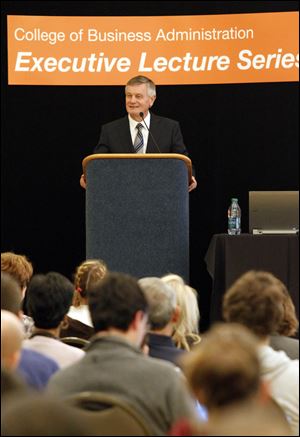
Leaders must rethink styles, O-I chief says
Stroucken urges BG students to engage with, motivate people
10/5/2011
Owens-Illinois CEO Al Stroucken, speaks to a full house at BGSU's executive lecture series on October 4, 2011.
BOWLING GREEN -- As the business world adapts to a global economy, companies must rethink their leadership methods or find themselves overtaken by competitors who have adopted ways of engaging and motivating their employees, one of the Toledo area's top business executives said Tuesday.
"Because we rely so much on other people, let's make sure you engage with other people because that's again how you get, not only to their minds, but their hearts," said Al Stroucken, chairman and chief executive officer of Owens-Illinois Inc., the Perrysburg glass bottle-making giant. "And if you want them to follow you, that's what you need to do."
Mr. Stroucken, a speaker at Bowling Green State University as part of the College of Business Administration's 2011 Executive Lecture Series, said that despite doing business on a worldwide scale, the fundamentals of leadership still apply.
"It is, of course, becoming more complicated because of the variety of markets, the variety of conditions, the variety of the economic environments under which we operate," he said. And speculation, not demand, now seems to be driving and affecting business conditions, he added.
Still, leading a company remains more than "just telling someone what to do," he said.
In the global economy, an effective leader has to recognize that maximizing global operations may require adopting specific local strategies for individual countries, and not implementing an overall strategy that may work in one region but not another.
At O-I, Mr. Stroucken said, it took a while but in the last few years the multinational company adopted a new leadership method that involves bringing the heads of all its various global operations together to hash out a strategy that takes into account the differences in world regions. Every department head is strongly encouraged to provide input and even be confrontational if need be, he added.
"People don't like that, and sometimes it takes several sessions. But it provides greater perspective for where the company needs to go and what it needs to do," Mr. Stroucken said. And "24,000 people [employed by O-I] depend on those 10 or 11 people in that room."
What makes that strategic session so important, the CEO said, is that O-I must always be looking several years ahead.
Success, he said, won't be determined by sales in North America or Europe, but in the emerging markets. "The world is changing, so we'd better be there as a global company and be ready for it," he said.
-- Jon Chavez